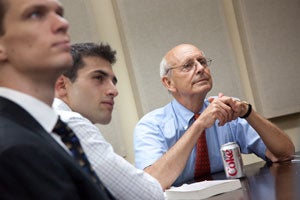Waving a pocket-sized copy of the U.S. Constitution, U.S. Supreme Court Associate Justice Stephen G. Breyer ’64 discussed the foundations of American democracy with Tunisian scholars at a conference hosted by NGO Almadanya on July 22 in the Amphitéâtre César in Yasmine-Hammamet, Tunisia.
“I’m very pleased to help in a cause for all jurists in the world,” Justice Breyer said in fluent French to university faculty, students and NGO leaders in Tunisia, where citizens hope to restructure the government and create a democratic constitution that guarantees equal rights.
The twist: Justice Breyer was able to participate in the dialogue about African democracy from more than 4,000 miles away, seated in Harvard Law School’s Areeda Hall.
His participation in the video conference was organized under the auspices of the U.S. Speaker and Specialist Program of the Bureau of International Information Programs (IIP) of the Department of State. IIP is one of two bureaus in the Department of State responsible for the management and administration of the nation’s public diplomacy programs.
The video conference was streamed live on IIP’s CO.NX Facebook page, and marked the first time a U.S. Supreme Court justice took part in a live social media event.
“The pro-democracy uprising in Tunisia was an important part of the ‘Arab Spring,’” said Department of State Judicial Liaison John Jasik. “Tunisia is a high-priority country for the State Department and it is important that our public diplomacy programs be configured to encourage the Tunisian people to seek peaceful democratic reform.”
Justice Breyer hoped that his discussion, which was conducted entirely in French for the benefit of conference attendees, would help drive the conversation in Tunisia, where representatives will be elected on Oct. 23, 2011, to pen the country’s new constitution.
And what key points should be made about the American Constitution?
“It’s short, it’s to the point, it has five important parts to it: democracy; protecting human rights; division of powers; equality and the rule of law,” Breyer said. “The main question is: why do people follow it? That’s taken us 200 years and a lot of history to establish, and it’s in part because the governing process in the United States bubbles up from the bottom, and is not imposed from the top. What we’re all trying to do is develop legal systems that protect us against arbitrary behavior. That’s an ongoing struggle … and I’m very glad to see we’re all dedicated to that, both [in Tunisia and the United States]. I’m very glad to have the opportunity to work together.”
On his interest in the French language, Breyer said: “It opens a window into different cultures all over the world. Since people in Francophone Africa and people in Anglophone Africa have very similar objectives in terms of establishing rule of law, there’s no reason that language should divide anyone.”
Breyer invited French-speaking HLS students to attend the video conference.
“I’m sure it will be one of my most memorable experiences from law school,” said Kirby Ifland ’13. “I’m grateful that Justice Breyer not only chose to include students in the conference, but also took the time to get to know each of us beforehand. The Supreme Court is often criticized as being withdrawn, but Justice Breyer himself was remarkably accessible and friendly.”
In his address to the conference, Breyer stressed the importance of keeping a constitution both concise and abstract – because a country’s values are impermanent, the constitution must allow the country to adopt new rules in keeping with contemporary values. It is the responsibility of Tunisian scholars and jurists to interpret and understand the constitution they create, he said. He added that justices of the U.S. Supreme Court often make unpopular decisions, which help protect the minority from the majority.
Breyer told the conference attendees that the struggle for liberty is ongoing and requires perseverance, citing change in the United States as an example: One American president (Andrew Jackson) sent U.S. troops to force Native Americans off their land, while about 100 years later, another (Dwight Eisenhower) sent troops to protect children as they entered a newly desegregated school.
The single most important thing, Breyer concluded, is an educated population. He urged the Tunisian scholars to educate their fellow citizens on the values of civics, liberty and the fight against tyranny.
– Sarah Marston and Timothy Lamoureux ’13
(Read a blog post by Timothy Lamoreux, “Liberté, Égalité, L’Internet in Tunisia with Justice Breyer,” on the Citizen Media Law Project website, hosted by the Berman Center for Internet & Society.)
